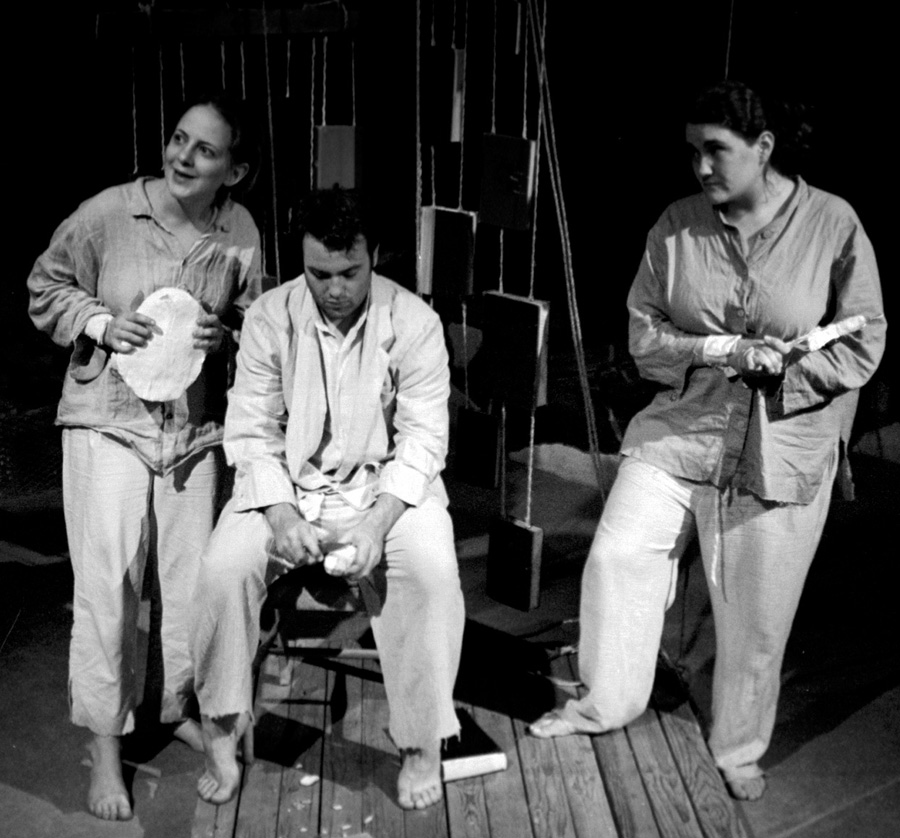Buntport Theater Company opened its new theatre a few months ago to the applause of nearly everyone who has ever seen one of their productions. The company, known for its multi-level wit and intelligently written comedic productions, has chosen to break new ground in the new space by staging its adaptation of Anton Chekhov’s Ward #6.
The new ground is serious drama, and although the group has always shown a subdued affinity for the genre, this play represents an evolution of sorts for Buntport. Chekhov’s Ward #6 explores the stoicism of the human psyche through warped lenses. Buntport extracts Chekhov’s twisted circularity from the piece and successfully shifts it into three dimensions. The effect is both stunning and numbing. Perfect, really, considering the nature of the work.
Chekhov was profound, and so is the Buntport version of Ward # 6. The organization of the play is intensely anonymous, with cast members flowing from one role to another, embodying the one collective psyche that rests at the center of Ward #6.
Acting is superbly sublime, and compliments the work rather than trying to overwhelm it. Brian Colonna, Hannah Duggan, Erik Edborg and Erin Rollman become one singular character going through differentiated movements, speaking with different voices, acting out different life passages, but always with one unified presence.
Drifting between the ward, and life in the town outside the ward, Buntport underscores Chekhov’s theme that we “know nothing of life, but are only theoretically acquainted with reality.” The townsfolk all seem like larvae in different stages of development, all destined to follow their primary instinct to crawl away from the light. It is the psychotic wretches, however, who reveal the deepest understanding of human life.
The ward is clearly the larger prison of reticent philosophers, while the human psyche creates cages far more incipient than any philosophy can explain. The Stoic’s pursuit of “True Happiness” falls to the Doctor, as he endeavors to inoculate himself against all human sensitivities. He believes “joy and suffering are passing,” and it is the disembowelment of this character that drives the work and the play.
Aside from phenomenal scripting and acting, the Buntport group has put together perhaps its most intriguing set. Walls of books, casts of various molds we allow ourselves to fill, barred windows we could walk around, but choose to hide behind all become part of the pathological motion of the play. Like some cobweb strewn cellar, the stage displays the contents of the human mind and the elements to which Chekhov alluded in Ward #6. And everything hangs in the balance. The elements of the set– representations of society’s teachings, barriers and molds– are all suspended from the ceiling by ropes just waiting to be manipulated by the cast, or the script, or the breeze. The effect represents both a grand design and an accident waiting to reveal itself. This is an immensely well planned and well executed set that resonates perfectly with the work.
There is little in life more disturbing or deeply moving than a well-crafted piece of experimental theater. The genre was meant to explore and expose, and Buntport has succeeded on both counts. The group has earned the right to claim outstanding artistic vision with the production of this piece of experimental drama. I strongly recommend this play.
-Cilicia Yakhlef, August 16-29, 2001, Go-Go Magazine
